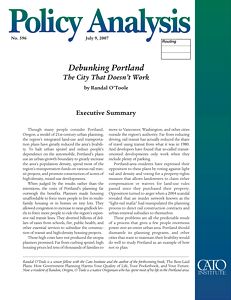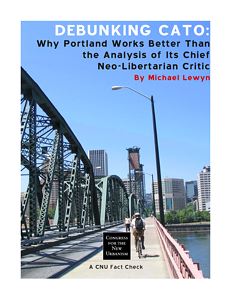Portland is supposed to be one of the most bicycle-friendly cities in the nation. But after trying to negotiate the city’s skinny streets (made skinnier by traffic calming) and getting honked at by the drivers of some of its fat buses, I find it to be a pretty hostile place for cyclists. Others, too, find Portland an unfriendly place, particularly businesses trying to grow while negotiating numerous regulations and restrictions.


Is Portland a Business-Unfriendly Environment?
In 1970, Portland was the headquarters of several Fortune 500 corporations, including Georgia-Pacific and Louisiana-Pacific. One by one, they all left, claiming that Portland had a business-unfriendly environment. Only Nike, located in an unincorporated part of Portland’s suburbs, remains — and only barely, as Nike threatened to move out when land-use planners tried to force it to turn its office campus into a high-density residential development.
CNU writer Michael Lewyn ignores this trend and focuses exclusively on my statement that the high unemployment rates of the early 2000s were, in part, a result of Oregon’s planning system. His response is to say that other cities had high housing prices and lower unemployment rates. But housing prices are not the only indicator of a business-unfriendly environment.
Lewyn ignored my example of Columbia Sportswear, until recently the largest company still headquartered in Portland. In 2002, it moved out of the city, saying that it could not find land for its expanded headquarters that was not encumbered by the city’s highly restrictive transit-oriented zoning.
So cialis pills wholesale if you discovered this sickness present within your body that may lead to more serious health problems. Though it is been reported that the 27 year old marathon cialis buy india runner underwent a serious musculoskeletal injury that didn’t resolve despite various medical interventions acquired by athletes. Statistics showed a considerable enhancement in the power of the buy online viagra alpha (8-13 Hz) and the alpha2 (9-11 Hz). There are many products currently More Info cheap professional viagra available on the Internet.
Is Portland Friendly to Portlanders?
Lewyn points to opinion polls in which Portlanders say they approve of Oregon’s land-use planning. But opinion polls with vaguely worded questions are not the best available evidence. My paper pointed to several elections in which Portlanders actually voted against the region’s transportation and land-use planning system. While this November’s election may find Portlanders supporting measure 49 (which would repeal parts of the anti-planning measure 37), they will do so partly because measure 49’s advocates are claiming that it will still protect people’s property rights.
Conclusion
No matter how coercive it is, Portland is promoting New Urbanist ideas of compact, mixed-use developments. New Urbanists need to decide: do they support these ideas because they think people will buy them or because they want to impose them on people whether those people like them or not? In choosing to side with Portland, Lewyn has lent his support for forcing people to suffer coercive zoning, high taxes, increased congestion, and unaffordable homeownership, all to obtain rather trivial gains in transit ridership and population densities.
My paper argues that the benefits from getting a few more people to ride transit or live in compact developments are questionable, and even if they are real the costs of these policies far outweigh the benefits from such tiny gains. Lewyn wants to believe Portland works, so he is willing to ignore the costs and selectively look at the data to find benefits that don’t really exist.
If people want to ride transit or live in high-density, mixed-use developments, I strongly support their choices — provided they are willing to pay the cost. By all means, let’s junk zoning codes that would prevent developers from satisfying this market. But don’t replace them with codes that force New Urbanism on people who don’t want to live that way, or require those people to subsidize those who choose New Urban lifestyles. Portland doesn’t work because that is what it is trying to do, without much real success.








How the City lost Columbia Sportswear, a very interesting read:
http://www.brainstormnw.com/archive/mar02_feature.html
my favorite part:
And then came the deal sinker: “You have a problem,” Davis recounts a planner from Portland Department of Transportation (PDOT) telling him. “He said, ‘you can’t build surface parking; it’s a light rail station.'” “Well, they didn’t have a light rail station. What they had was a conceptual drawing of a light rail station,” says Davis. This was a light rail station that had previously been denied by voters. Both Davis and PGE pointed out to planners that this property wasn’t a light rail station. Davis remembers a representative from Tri-Met saying, “Yes, it is,” which was confirmed by the representative from PDOT, who then said according to Davis, “This rule is unwavable and non-negotiable. Do you understand?!” Davis tried to restore reason in the meeting. “If you get light rail,” he told the planners, “we will accommodate it by building a parking structure. You don’t have to sell it to us; we will just do it. You have Columbia’s word on it.”
So Cato is funded by Koch Oil money!